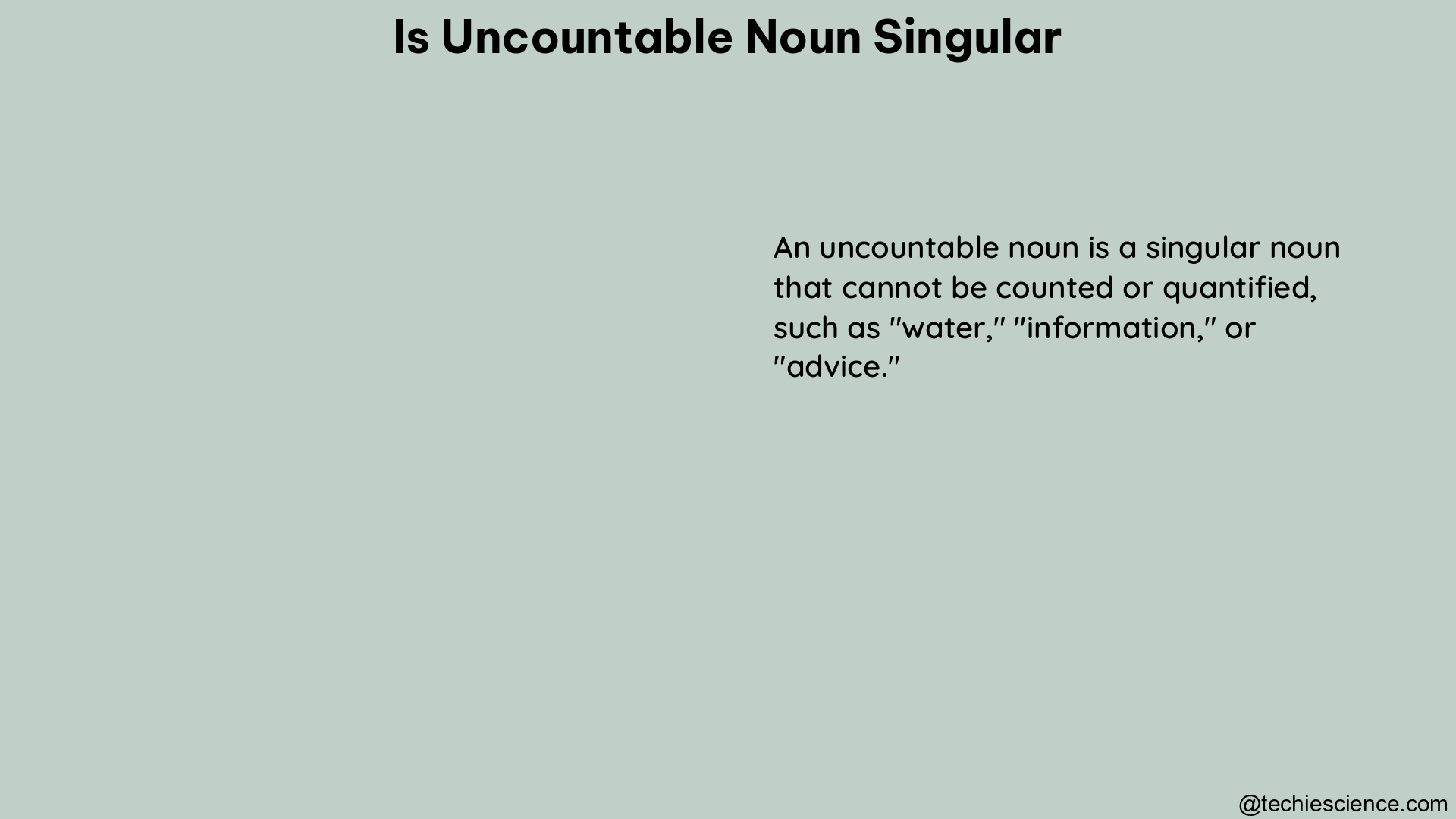Uncountable nouns, also known as mass nouns, are a fundamental concept in English grammar that can often confuse language learners. These nouns refer to things that cannot be counted individually, such as liquids, gases, abstract ideas, and some physical objects that are too small or amorphous to be enumerated. Mastering the usage of uncountable nouns is crucial for accurate and fluent communication in English.
Understanding Uncountable Nouns
Uncountable nouns are always considered singular in English grammar, regardless of the quantity they represent. This means that they are used with singular verbs and do not have a plural form. For example, the noun “water” is uncountable, so we say “The water is clear” rather than “The waters are clear.”
Characteristics of Uncountable Nouns
-
Singular Form: Uncountable nouns are always in the singular form and do not have a plural version. For instance, we say “the rice” instead of “the rices.”
-
Singular Verbs: Uncountable nouns are used with singular verbs, even though they may refer to a large quantity of something. For example, “The information is available on the website.”
-
No Articles: Uncountable nouns are not used with the indefinite articles “a” or “an.” Instead, they are used with words like “some,” “much,” “little,” or no article at all. For instance, “I need some water” or “I have knowledge about the topic.”
-
Quantifiers: Uncountable nouns are often used with quantifiers like “some,” “a lot of,” “much,” “a little,” and “a bit of” to express the amount or quantity.
Examples of Uncountable Nouns
Here are some common examples of uncountable nouns in English:
- Liquids: water, milk, juice, oil, wine, coffee, tea
- Gases: air, oxygen, nitrogen, steam
- Abstract Concepts: knowledge, information, advice, research, evidence, beauty, anger, fear, love
- Substances: rice, sugar, flour, salt, sand, dirt, money
- Collective Nouns: furniture, luggage, equipment, machinery, jewelry
It’s important to note that some nouns can be both countable and uncountable, depending on the context. For example, the word “hair” can be uncountable when referring to hair in general (“I need to brush my hair”), but countable when referring to individual strands (“I found a few gray hairs”).
Theoretical Explanation

The distinction between countable and uncountable nouns is a fundamental aspect of English grammar that affects the usage of determiners and verbs. Countable nouns have both singular and plural forms, allowing for the expression of specific quantities (e.g., “one book,” “two books”). In contrast, uncountable nouns are always singular and do not have a plural form.
This difference in form influences the choice of verbs and determiners used with these nouns. Uncountable nouns are always used with singular verbs, even when referring to a large quantity of something. Additionally, they are not used with the indefinite articles “a” or “an,” but rather with quantifiers like “some,” “much,” or “a little.”
The reason for this grammatical distinction lies in the nature of the nouns themselves. Countable nouns refer to discrete, individual entities that can be enumerated, while uncountable nouns represent substances, materials, or abstract concepts that cannot be easily divided into distinct, countable units.
Advanced Considerations
-
Abstract Nouns: Uncountable nouns often include abstract ideas and concepts, such as knowledge, beauty, anger, fear, and love. These nouns cannot be counted or divided into individual units.
-
Physical Objects: Some physical objects, like rice, water, and air, are considered uncountable because they cannot be easily counted or divided into distinct parts.
-
Contextual Variations: As mentioned earlier, some nouns can be both countable and uncountable, depending on the context. For example, the word “hair” can be countable when referring to individual strands (“I found a few gray hairs”) or uncountable when referring to hair in general (“I need to brush my hair”).
-
Measurement Units: When dealing with uncountable nouns, it is common to use measurement units to express quantity, such as “a cup of water,” “a liter of milk,” or “a pound of sugar.”
-
Collective Nouns: Certain collective nouns, such as furniture, luggage, equipment, machinery, and jewelry, are also considered uncountable because they represent a group of items that are not easily counted individually.
Conclusion
Mastering the usage of uncountable nouns is a crucial aspect of English grammar that can greatly improve your language proficiency. By understanding the characteristics of uncountable nouns, such as their singular form, usage with singular verbs, and the absence of indefinite articles, you can communicate more accurately and effectively in English.
Remember, the distinction between countable and uncountable nouns is not always clear-cut, and some nouns can be used in both ways depending on the context. Paying attention to these nuances and practicing their usage will help you become a more confident and fluent English speaker.
References
- Cambridge Grammar of the English Language. (2022). Uncountable Nouns. Retrieved from https://www.cambridge.org/grammar/grammar-reference/uncountable-nouns
- Ginger Software. (2022). Uncountable Nouns: Definition, Examples, and Usage. Retrieved from https://www.gingersoftware.com/content/grammar-rules/nouns/uncountable-nouns/
- EF United States. (2022). Uncountable Nouns. Retrieved from https://www.ef.com/wwen/english-resources/english-grammar/uncountable-nouns/
Hi… I am Sowndharya Jagadeeswaran, a university rank holder in M.A. English Literature. I have also done my master’s in Business Administration. Inquisitive as I am, my interest in action-oriented research helped me publish research papers in reputed journals. Now, as a career, I am an instructor where I teach young and adorable students the intricate technicalities of Public Speaking and Creative Writing. I also enjoy writing articles on topics I specialize and research in.
You can connect with me through LinkedIn.-